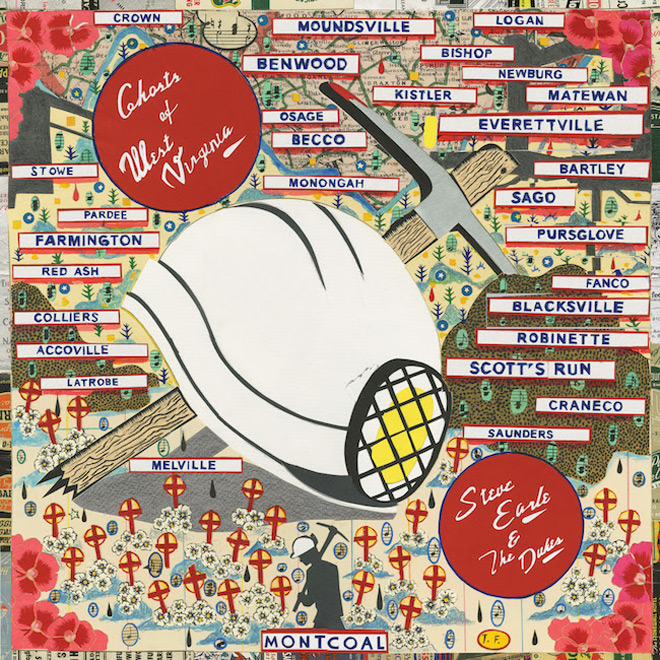
The twentieth studio album for Earle, coming on the heels of his 2016 Guy Clark tribute Guy, Ghosts of West Virginia features his usual co-horts; the Dukes, comprised of Eleanor Whitmore on fiddle/vocals, Chris Masterson on guitar, Ricky Ray Jackson on guitar/pedal steel/dobro, Jeff Hill on bass, along with Brad Pemberton on drums/percussion.
So where does the story behind Ghosts of West Virginia come from? Well, Earle was asked by Playwrights Erik Jensen and Jessica Blank to help with their new work, Coal Country, based on the events of the Upper Big Branch mining disaster, an explosion which claimed the lives of 29 men (out of 31 on site) just ten years ago. This in mind, Ghosts of West Virginia’s album cover itself expands the mining theme; mentioning roughly thirty locales by name, and by extension, the sites of horrific mining disasters – places like Everettville (1927), Blacksville (1972), Farmington (1968), Scott’s Run (two), and Colliers (several). The largest font names the town of Montcoal, home to the Upper Big Branch mine.
Packed within a tight thirty minutes, Ghosts of West Virginia yields ten tracks that run the gamut of emotion, sanity, loyalty, and faith. “Heaven Ain’t Goin’ Nowhere” opens the proceedings as something of a prayer, less about salvation, or prosperity, or even a request. It is more about the inevitability of working life, and the reward, however small, that awaits those who enter and leave the mine each shift. From here the moods alternate, from bitter diatribes like “Devil Put the Coal in the Ground” and “It’s About Blood” to brisk, upbeat missives to like “John Henry Was a Steel Drivin’ Man” and dramatic ballads like “Time is Never on Our Side.”
On the rambunctious “Fastest Man Alive,” Earle channels his inner Chuck Berry as if Bruce Springsteen was driving, circa 1982’s Nebraska. Then “Union, God, and Country” puts the motivation and thanks of miners on display. They compare their current working conditions, however bleak, to the old days of intolerable conditions paid in truck wages, at a time when absolutely no one was paying attention to the health, wealth, or the welfare of those underground. This before the intense ballad “Black Lung,” which is a warm, playful look at the common physical and emotional ailment of miners.
The names of the twenty-nine miners lost at Upper Big Branch are poignantly listed within “It’s About Blood,” a tense, angry revolt against the lies and deception put forth by management upon the working masses. The pace halts almost completely as the track moves onto the ballad-like “If I Could See Your Face Again,” on which Eleanor Whitmore takes lead vocal. Which leads us to the resigned closer, “The Wake,” standing for a broken man relegated to his current state by politics, by economics, and by geography. These are three things which, when intertwined, amount to a stranglehold on improvement and prosperity, leaving workers to focus on immediate and imperfect gratification.
From an outside view, it is much easier to ask how these workers and families willingly sign up for these conditions. However, Ghosts of West Virginia makes a strong case to explain the historical and familial pulls that keep things as they are. Long known as a leaning liberal, Earle presents this album as a pointed effort to get into the minds and hearts of workers whose political views vary wildly from his. That is why Cryptic Rock Ghosts of West Virginia 4.5 out of 5 stars.





